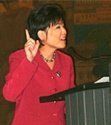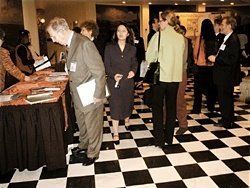One of the longest nerves in the body is known as the vagus nerve (VN). The VN is the 10th pair of cranial nerves that originates at the brain stem in the medulla oblongata. This nerve is part of the parasympathetic nervous system, which is a part of the ANS. Research suggests ear acupuncture can activate the VN.
Oriental Medicine Advocacy Day at the California State Capitol
As a practitioner of Oriental medicine, if you could select a single 8-hour time frame - one day of your life - where the impact and benefit of your involvement could serve not only the future of your practice, but the profession at-large, then Oriental Medicine Advocacy Day is an annual event you shouldn't miss. The event was held on Wednesday, Jan. 21, 2004, on the eve of Chinese New Year, at the state capitol in Sacramento. Sponsors included Assemblywoman Judy Chu (D - 49th District), the California State Oriental Medical Association (CSOMA), Southern California University of Health Sciences (SCU), and two acupuncture suppliers (Kan Herb Company and Seirin America).

As a profession, our scope of practice and status as primary care providers is being evaluated (as mandated by Senate Bill 1951) by the Little Hoover Commission (LHC), at a depth never before experienced. Outcomes of this evaluation will remain unknown until September 2004. Equally, there are ongoing changes to workers' compensation that impact the ability of acupuncturists to provide treatment, and increasingly, insurance carriers are restricting coverage of acupuncture to MDs only (in the form of medical acupuncturists). Health care is a dynamic and sophisticated marketplace that is operating in the same restrictive economy as other market sectors. The unity of our voice in representing ourselves in all these markets has never been more critical; your involvement as a practitioner has never been more crucial. Those involved in organizing, promoting and participating in OM Advocacy Day did so to "heed this call to action" as they saw that reaching out to and educating their legislators allowed them, in fact, to reach the constituency...the population of the entire state of California. As such, the event's dual focus was designed to:
- Increase the practitioner's understanding and awareness of the legislative and political process as it impacts the future of Oriental medicine; and
- Enhance the legislator's (as well as key staff and personnel) understanding of Oriental medicine as an alternative treatment modality for addressing acute, chronic and preventative health care issues.
Legislative Advocacy
From an advocacy standpoint, the wisdom of Kathryn Dresslar, chief of staff to Assemblyman Darrell Steinberg, chair of the appropriations committee, was shared with Oriental medicine practitioners. Keen attention was focused on developing and furthering the cause of Oriental medicine advocacy - for example, the importance of not being intimidated; being prepared; developing a relationship with your legislator through personal visits that offer yourself as a resource; being effective in written communication; and the use and benefit of the media. She stressed that having a "grassroots" legislative advocacy was quite different from hiring a lobbyist.
Awareness of the fundamentals of advocacy was heightened by Dresslar's sharing her "11 Commandments of Good Policy Making" from the perspective of the staff, who serve the needs of the legislators (and thus their constituencies). Through her words, we saw and understood our pursuit of the advancement of Oriental medicine from the perspective of legislative staff, as all interaction with our legislators revolves around this understanding and the business/legislative protocols that must be followed to succeed. The morning's legislative activities culminated with practitioners visiting their legislators' offices. They provided informational background on Oriental medicine, invited legislators to immediately experience acupuncture for themselves in one specific area - stress and relaxation - and offered their services as a resource that could be called on in the future as the need for additional information on Oriental medicine arises.
Advocacy
As it relates to Oriental medicine advocacy, the importance and goal was to provide the greatest exposure and understanding of Oriental medicine within a very limited time frame. To achieve this, the afternoon activities began with CSOMA Director Gena Spencer, LAc, who provided an overview of acupuncture to members of the legislative community. Her presentation transitioned to a group discussion addressing the role of Oriental medicine alongside Western medicine and the use of herbal therapies. For the remainder of the afternoon, participating acupuncturists provided one-on-one treatments for stress and relaxation to more than 85 legislators and staff members!
In CSOMA's six years of hosting or co-hosting this type of an event at the Capitol, this figure more than doubled the number of treatments previously provided. The legislature's receptivity was phenomenal! One legislator's chief of staff stated that we "made a real convert out of his boss," while another stated, "We needed to truly comprehend and appreciate the depth of good will, education, and understanding that was being generated through this event!"
Rotunda Reception
The daylong activities culminated with a gala reception in the Capitol Rotunda, celebrating Oriental Medicine Advocacy Day alongside a welcoming of the Chinese New Year. Featuring an exquisite Asian buffet, Legislative attendees were given the opportunity to sample relaxation, energy, and immunity elixir's offered by Kan Herb. Equally important, they were able to see first-hand the quality of education required to become a licensed acupuncturist in California, as demonstrated by Southern California University of Health Sciences College of Acupuncture and Oriental Medicine.

Assemblywoman Chu provided the keynote address. As a member of the California Assembly, Dr. Chu chairs the Budget Subcommittee on Health and Human Services, which oversees $60 billion in spending for health and human services programs annually. As a legislative leader in the advancement of Oriental medicine, Chu was the author of AB 1943. This bill required an increase in Oriental medicine educational standards to include a minimum of 3,000 hours of study (increased from 2,348) in curriculum pertaining to the practice of an acupuncturist, and required that the revised standards be established by the board on or before Jan. 1, 2004, with mandatory implementation for all students entering programs on or after Jan. 1, 2005.
The struggles Chu faced in her enactment of AB 1943 were visible early on, as seen in her statement to the OM community: "We have a huge uphill battle. Not a lot of people understand acupuncture in Sacramento. If we go ahead, then you have to be committed to fighting for this bill. They said, 'Let's go ahead.'" With the united commitment of the profession (and the involvement of hundreds of practitioners) in combination with Chu's leadership, AB 1943 was chaptered Sept. 22, 2002. Chu reflected on those events to us Wednesday evening: "What was most inspirational for me in this whole process is to know that many of the acupuncturists had not ever been involved before or even stepped foot in the Capitol before. Yet they made such a difference."
The success of this year's event coinciding with the Chinese New Year was seen as a valuable tool to further expand legislation, and thus statewide constituency education and awareness of traditional Chinese medicine, as it allowed those involved to experience a far deeper appreciation of the ancient art and science of not only Oriental medicine, but also Chinese culture and traditions. Those interested in participating in next year's event should contact CSOMA via www.csomaonline.org, or call (800) 477-4564.



